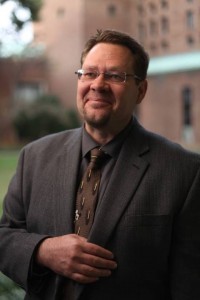Neither Good, nor Bad, nor Neutral
 Prospective master of divinity and master of theological studies students are invited to join Dean Emilie M. Townes and a featured faculty member for an informal dinner and faculty research presentation. On Tuesday, 3 November 2015, Jaco Hamman, director of the Program in Theology and Practice and associate professor of religion, psychology, and culture addressed the topic of technology and the self.
Prospective master of divinity and master of theological studies students are invited to join Dean Emilie M. Townes and a featured faculty member for an informal dinner and faculty research presentation. On Tuesday, 3 November 2015, Jaco Hamman, director of the Program in Theology and Practice and associate professor of religion, psychology, and culture addressed the topic of technology and the self.
Neither Good, nor Bad, nor Neutral
By Jaco Hamman
Associate Professor of Religion, Psychology, and Culture
Director of the Program in Theology and Practice
Historian of technology, Melvin Kranzberg, states that “Technology is neither good nor bad; nor is it neutral.” Kranzberg’s “law” is one of six he drafted to guide conversation around the human/technology encounter. Kranzberg’s first law challenges every person who is an extended self—a self with a cell phone, with a tablet, with a smart watch, or with a laptop or larger screen. We best heed psychologist William James’ wisdom in his The Principles of Psychology (published in 1890): “[The self is] the sum total of all that a man CAN call his, not only his body and his psychic powers, but his clothes and his house, his wife and children.” Talking of a person as a complete subject is impossible, for the extended self is a person with possessions. James reminds us that our emotional lives are intricately tied to what we call our own.
Kranzberg’s dictum and the extended self demand discernment over a wide spectrum else risking becoming a gadget oneself, losing core aspects of one’s human nature. Theological anthropology can help us rediscover the importance that we live a facial existence as we engage an in-your-face God (See Numbers 6:24-26); Psychology elucidates how we enter into deep relationships with subjects and objects as we shape a personal identity; Sociology explicates the forces that shape community, whether online or face-to-face; Philosophy seeks answers to personhood and the meaning of life; Neuroscience explains why we feel anxious when we do not check in with our devices and more relaxed when we do so; Economic theory describe the birth and exploitation of the commodified self; Technological science provides ways to enhance and diminish human nature. It requires multi-disciplinary discernment to reflect on today’s self.
Kranzberg’s sixth law states that “Technology is a very human activity—and so is the history of technology.” At Vanderbilt University Divinity School, the contemporary self is embraced and studied. We know that the question of leadership is also the question of human nature. Flourishing and ethical leadership beckons a deep awareness of the extended self. Implicitly the discernment anticipated by the dictum that technology is neither good, nor bad, nor neutral is never ending. As we remain driven by technological advances and as robots increasingly replace persons in the workplace or as partners, Vanderbilt Divinity students have access to a seasoned, published faculty to inform conversation and discernment as we strive for a just society where all persons flourish. Students also benefit from a university context that stimulates conversations. Do visit with us and discover who we are and how we can equip and empower you for leadership.